- Getting around Lijiang. Dont stay in the Old Towns more than 2 days, there is nothing to do. KRISS Oct 9, 2013 05:46
- 2013 Beijing Temple Fair BENNYLAU Feb 26, 2013 03:29
- Malaysian traveling from KUL - LAX vis Shanghai PVG ZATI_DY Jan 3, 2013 20:15
Kashgar's Best-Kept Secret: Karakul Lake
- Views: 7175
- |Vote: 1 0
- |Add to Favorites
- |Recommend to Friends
State Highway 312 is an unforgettable route as it meanders through the hills and mountains on the way to Pakistan. It is a paved road, to be sure, but it rarely ever feels like it. Whether you are stopping to wait for camels to cross the road, honking to get around a herd of sheep, swerving to avoid parts of the road missing due to landslides, or pulling over just because you want to get out of the car to take a picture, you’ll find that this short three hour ride from Kashgar to your destination could easily turn into four or five.
What is the destination, exactly? This road, named the Karakoram Highway, leads directly to the Pakistani border, but unless you have business there and a pre-arranged visa, they’ll turn you right back around and send you home. Fortunately, just 192 km out of Kashgar and 3600 meters above sea level is the Karakul Lake, a stunning combination of turquoise water and grandiose mountains that turn even the most novice photographers into instant professionals. The lake itself is small by most standards, reaching a depth of only 30 meters and can be circumnavigated in a matter of hours on foot, but its location makes this lake one of the best-kept secrets in Xinjiang tourism.
If you’re looking for a hotel nearby when you first arrive, you’ll be thoroughly disappointed. The only concrete you’ll see around here is what you’re driving on. Electricity? Way overrated and far too modern. You won’t find power lines around here because the only electricity they get is what is generated by a couple of wind turbines and some solar panels. This isn’t a place to go for a vacation when you retire; no, you come here for an experience. Thankfully it will be an experience you won’t forget.
Instead of hotels, you will find the landscape dotted with tiny, white yurts which can be rented out for accommodation. These Yurts, which in the Turkish language means “dwelling place”, are tent-like structures designed for nomadic peoples to easily pack, transport, and reassemble where necessary. Although many different types of yurts exist (Mongolian, Kazakh, Pakistani, etc.), the area around here is Kyrgyz, so the yurt you stay in, the food you eat, and the people you meet will almost all have this influence. Mud-brick housing is what the locals now use for shelter, so chances are every yurt you see is either rented or waiting to be inhabited by travelers.
The first thing that might catch your attention when you arrive at Karakul Lake and get yourself situated in a yurt is the silence and solitude. Cars aren’t a frequent distraction and no electrical appliances litter the area with noise. Yaks, sheep, and camels quietly graze in a nearby field, not noticing or caring that you’ve invaded their territory. You can take a deep breath to experience at least one part of China whose air isn’t polluted. Of course, the best thing to do is to take out your camera and start snapping pictures as fast as your memory card can process them.
Karakul Lake lies in the shadows of the grand Mustagh Peak, which reaches an elevation of 7,509 meters and is covered in show all year round, as well as the Gonger Peak and the Gongerjiubie Peaks. On a calm day the lake becomes a giant mirror reflecting with clarity every detail of the gorgeous mountain beauty, but even the lake itself is worth admiring. Every hour of the sun’s presence in the sky allows the lake the opportunity to show off a different color of the spectrum, from turquoise or light blue, to even light pink or yellow. Even the outline of the clouds drifting over the mountains is painted in pristine colors on the surface of the lake. You better hope you have an extra camera battery because you’re not going to want to run out of power at any point during the day.
Surprisingly there are many options for things to keep you busy around the lake. Horses, camels, and motorcycles can all be rented to explore the area or circumnavigate the lake. Small hills, although dwarfed by the larger mountains, offer plenty of opportunity to hone your mountaineering skills and give you a better vantage point from which to take your pictures. For those who are more skilled or perhaps a bit crazy, expeditions to scale the larger mountains in the area can definitely be arranged. The best option, however, is to just take a few hours to walk around the lake on foot, either chatting with a good friend or silently contemplating life and the beauty of creation. Along the way you could even get a chance to see cattle, a small village, and maybe even a local cemetery.
As night falls on the lake, it should be encouraging to know that the best has been saved until last. After a refreshing homemade meal prepared by your Kyrgyz hosts, you might begin to settle in for the night in your unique, if not surprisingly comfortable yurt. Large blankets and comforters laid out on the ground provide a place to sleep and a small battery charged by solar light keeps the one bulb in the yurt shining. Because there are no toilets or sinks to be found inside a yurt, you must exit outside to perform basic tasks such as brushing your teeth or washing up, but one look up towards the sky and you’ll forget all about your hygiene.
Even though you can’t see the lake, the mountains, or even your feet for that matter, what you can see is more stars than you’ve ever witnessed in your life. If you’ve ever wanted to see the Milky Way, here’s your chance! Satellites and shooting stars can be counted on more than two hands. Hundreds of thousands, if not millions of stars blanket the sky like you never thought possible and are a reminder of just how small we really are in this galaxy. Weather permitting, laying out under the stars for an hour or two is something you don’t want to miss.
It’s difficult to leave a place like this, but the comforts of home, regular food and electricity bring most people back. Pictures here are worth framing, so prepare some space on your wall at home. This is a trip you won’t want to soon forget.
Getting There from Kashgar
Home base for this trip is Kashgar, so get settled there and enjoy looking around. The hardest part about traveling to Karakul Lake is arranging for transportation. Unfortunately, the Lonely Planet offers little help in this matter, and the help it does offer is very misleading and in some cases incorrect. The most important thing you must know before paying for transportation is that a government-issued travel pass is necessary to take this highway. There is one major police checkpoint where travel documents and travel passes must be shown and authorized for both you and your driver, so be careful.
This means that although it may be possible to take a bus from the long-distance bus station, you need to have all your ducks in a row before you do so. We personally found it close to impossible to find the right bus station, and once we did we were told that they wouldn’t even sell us the tickets without the proper paperwork from the government.
This leaves you only a few options to choose from. The first is to try to apply for the travel pass, figure out who to talk to, and pick it up on your own. Although this might be a much cheaper option, it is highly difficult even for those of us who do speak Chinese. The second and most preferred option is to arrange for a trip through a travel group in Kashgar. Trips for four range anywhere from 700-1300 RMB and can be found at the local CITS or a couple of the more well-known western cafes around town. These places will fill out all the necessary paperwork, pick up the travel pass for you, and provide you with a car and driver for your journey. Problem solved; headache gone. The best thing to remember when driving is that you paid for this trip and you are not on the meter. Any time you want the car to stop and take pictures, just tell the driver! Just make sure you don’t take any pictures of the police or their checkpoint. They don’t seem to like that.
Costs:
Transportation costs (round trip): 700 to 1300 RMB for four people
Horseback/Camel/Motorbike Riding: 30 to 60 RMB per hour, or a negotiated price to circumnavigate the lake. FYI, you don’t get these to yourself – the animals come with handlers and the motorbikes come with a driver.
Accommodation: 50 RMB per night on average
Food: 10-15 RMB for a meal at the yurt, but it is good to bring your own food. There is no supermarket readily available.
Scaling the mountain: I was quoted at about 8,000 RMB for a team of 6, but I can’t tell if he was serious. The guide I spoke with told me that of the 300 visitors who scaled the Mustagh Peak last year, three died, so it doesn’t sound like the safest option.



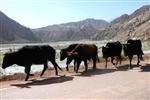
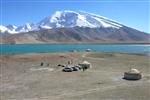
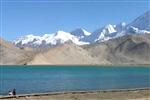
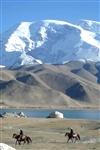

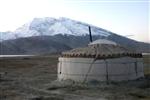
 Copyright © 1998-2026 All rights reserved.
Copyright © 1998-2026 All rights reserved.
1.
Dec 7, 2008 23:11 Reply
LEMONCACTUS said:
I'm planning a trip to xinjiang myself for next summer, fingers crossed it will come to fruition, will definitely put this place on the growing list of must-sees :)